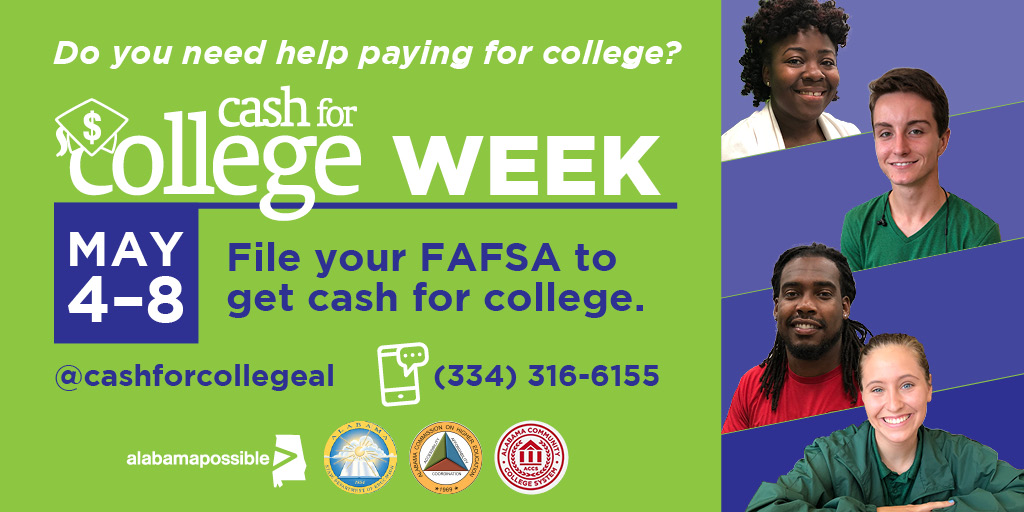
High school seniors and college students will be encouraged to complete their Free Application for Federal Student Aid (FAFSA) during Cash for College Week, May 4-8.
“Many families’ financial circumstances have changed over the past few weeks, and students are trying to navigate how to pay for college without being able to see their school counselors and career coaches in person. They also can’t visit colleges to get help with admissions, registration, and financial aid decisions,” said Alabama Possible Executive Director Kristina Scott.
Students and families must complete the FAFSA to access federal financial aid, including the Pell Grant, work-study jobs and federally-guaranteed student loans. Many colleges also use information from the FAFSA to decide which students receive scholarships, also known as institutional aid. Some national scholarships, like the Bill Gates Scholarship, also require FAFSA completion.
According to the Cash for College FAFSA Dashboard, only 43 percent of Alabama’s high school senior class has completed their FAFSA. Most Alabama high school seniors will qualify for a Pell Grant of up to $6,395. Pell Grants are “gift aid” and do not need to be paid back, and they can be used for both academic and technical education at two- and four-year colleges and universities. Last year, Alabama families left approximately $60 million in Pell Grant aid on the table by not completing the FAFSA.
“It’s more critical now than ever that students file the FAFSA. In this time of uncertainty, it is critical to focus on that which we can do. Filing the FAFSA in order to maximize the amount of aid that students can use to continue their education after high school is within reach of students and families,” said Dr. Eric Mackey, state superintendent of education.
The Alabama Community College System’s 24 colleges are tailoring approaches to fit local needs. For instance, Central Alabama Community College is hosting a Facebook Live financial aid Q&A session with Financial Aid Director Stephanie Miller on Monday, May 4, at 7 p.m. Alabamians are invited to join the conversation on Central Alabama Community College’s Facebook page.
“More than half of Alabama’s community college students use financial aid to achieve their education and workforce training,” said Jimmy H. Baker, chancellor of the Alabama Community College System. “We are committed to providing education and training to every Alabamian looking to improve their future, and we are proud to support Cash for College Week to ensure every Alabamian can access the funding available to them through the completion of the FAFSA.”
According to the National College Attainment Network (NCAN), FAFSA completion is strongly associated with postsecondary enrollment: 90 percent of high school seniors who complete FAFSA attend college directly from high school, compared to just 55 percent of FAFSA noncompleters. Second, research has found that every additional $1,000 in grant aid per student increases postsecondary persistence rates by 4 percentage points.
“Governor Ivey’s Success Plus goal calls for adding 500,000 individuals with valuable postsecondary credentials to Alabama’s workforce by 2025,” said Dr. Jim Purcell, executive director of the Alabama Commission on Higher Education. “Completing the FAFSA is the first step towards making education after high school more accessible to every Alabama student.”
Cash for College Week will use text messaging and social media outlets (@CashforCollegeAL: Twitter, Facebook and Instagram) to get the word out to students about the importance of completing the FAFSA.
To receive virtual assistance to complete the FAFSA, students and families can visit cashforcollegealabama.org, send a Facebook message to @cashforcollegeal, text the Alabama College Attainment Network at (334) 316-6155 or email [email protected].
About the Alabama College Attainment Network
The Alabama College Attainment Network breaks down barriers to increase college readiness, access, and completion in Alabama, particularly among low-income students, first-generation college-going students, and students of color. Alabama Possible serves as the backbone agency for the network, and the Alabama State Department of Education, Alabama Commission on Higher Education, and Alabama Community College System are founding members.